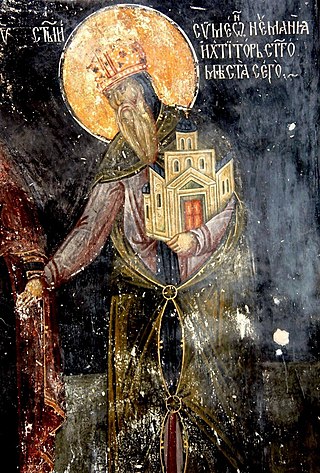Related Research Articles
Bogdan or Bohdan is a Slavic masculine name that appears in all Slavic countries as well as Romania and Moldova. It is derived from the Slavic words Bog/Boh, meaning "god", and dan, meaning "given". The name appears to be an early calque from Greek Theodore with the same meaning. The name is also used as a surname. Bogdana is the feminine version of the name.
Polish names have two main elements: the given name, and the surname. The usage of personal names in Poland is generally governed by civil law, church law, personal taste and family custom.

Nemanja is a masculine Serbian given name. It is derived from the by-name borne by the founder of the Nemanjić dynasty, Stefan Nemanja (1114–1199), a Serbian grand prince who was venerated as a saint after his death.
Đurić is a surname found in Croatia, Bosnia and Serbia, a patronymic derived from the male given name Đuro or Đura. Notable people with the surname include:
This article features the naming culture of personal names of ethnic Serbs and the Serbian language. Serbian names are rendered in the "Western name order" with the surname placed after the given name. "Eastern name order" may be used when multiple names appear in a sorted list, particularly in official notes and legal documents when the last name is capitalized.
Kralj is a South Slavic surname and title. It literally means "king" and, according to Petar Skok, is derived from Charles the Great (Karolus) in the same sense as Tsar is to Caesar.
Radonjić is a Serbian surname, a patronymic derived from the given name Radonja.
Radul or Radule is a Slavic given name, derived from the word rad, meaning "work, care ". It is the base of the Serbian surnames of Radulović, Radulić, Raduljica, and the Russian and Bulgarian Radulov. Several toponyms are derived from the name, such as Radule in Poland, Radul in Ukraine, Radulovtsi in Bulgaria, etc.
The Bagaš was a Serbian noble family that served the Serbian Kingdom and Empire.
Vukašinović is a Bosnian, Croat, Montenegrin and Serb surname derived from a masculine given name Vukašin. Notable people with the surname include:
Vukasović is a Serbo-Croatian surname, a patronymic derived from the Slavic name Vukas, a variant of Vuk. Notable people with the surname include:
Latas is a surname, found in many countries in Europe, mainly in Serbia, Poland, Croatia, but also Spain and Portugal from Middle Ages. However their mutual geographical and lexical origin is undetermined.
Bogić is a Serbo-Croatian male given name and surname, predominantly borne by ethnic Serbs, derived from the word bog meaning "god". It may refer to:
Nikola Radonja or Nikola Radonja Branković or Gerasim or Roman, was a 14th-century Serbian nobleman and chronicler, a member of the Branković dynasty as the eldest son of Branko Mladenović. He is remembered as the author of "Gerasim's Chronicle."
Radonić is a Serbo-Croatian surname.
Staniša is a Serbian masculine given name, derived from Slavic root stan and suffix -iša. It was traditionally given as an apotropaic (protective) name, when children often died, or when many children were born. It has been used in Serbian society since the Middle Ages. It may refer to:
Miljko is a Serbian masculine given name, derived from Slavic mil- and hypocoristic suffix -ko, both very common in Slavic dithematic names. It may refer to:
Vukajlo is a Serbian given name, derived from the masculine given name Vuk. All the derivatives from vuk were regarded as apotropaic names. It may refer to:
Radonja Petrović, known as Vojvoda Radonja was the vojvoda (duke) of the Kuči tribe. Radonja's father Petar was a middle child of Vojvoda Iliko Lalev and held the title until his death when it was passed to his brother priest Mirčeta. Radonja, thus, succeeded his uncle Mirčeta as the duke of Kuči, being the great-great-grandson of Drekale, eponymous founder of Drekalovići. He came to be the leader of a group of tribes in what is today eastern Montenegro that, together with Habsburg Serbian troops, fought against the Ottomans, and was granted the title Guvernadur of all the Hills by Venetians, for whom he managed the postal traffic with the Ottomans.
Vuksan is a Slavic masculine given name, derived from Slavic noun vuk, "wolf". It is a hypocoristic, possibly of the name Vukoslav. It is attested in the Middle Ages, and Serbian epic poetry. It is also used as a surname. The patronymic surname Vuksanović is derived from the name. It may refer to:
References
- ↑ Viktor Novak (2009). Revue historique. p. 222.
- ↑ Tatomir P. Vukanović (2001). Enciklopedija narodnog života, običaja i verovanja u Srba na Kosovu i Metohiji: VI vek - početak XX veka : više od 2000 odrednica. Vojnoizdavački zavod. p. 402.